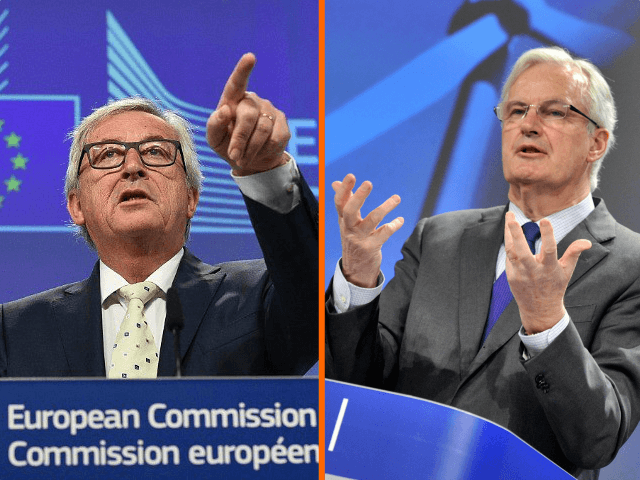EU chief negotiator Michel Barnier badly damaged Theresa May’s credibility on Friday, confirming that her concession-laden Chequers plan for Brexit continues the supremacy of the EU court over the UK.
Barnier was delivering his first public verdict on Mrs May’s ultra-soft Brexit plan since she imposed it on her Cabinet at the prime ministerial country retreat, an event which caused cabinet minister David Davis to resign as Secretary of State for Exiting the European Union last week, on grounds that British independence under the plan would be “illusory rather than real”, and with Foreign and Commonwealth Secretary Boris Johnson following his lead shortly afterwards.
The Prime Minister claimed her plan would end free movement, restore parliamentary sovereignty, and end the supremacy of the Court of Justice of the European Union (CJEU/ECJ), in line with what the public were promised ahead of the EU referendum and in her own 2017 election manifesto.
Critics, including the former Brexit Secretary and Foreign Secretary, said the Chequers plan would merely rebrand Britain’s EU membership in many important aspects, with Free Movement replaced by a “labour mobility package”, swathes of EU law reapplied through the adoption of a so-called “common rulebook” maintained by the EU, and the EU Court not having direct jurisdiction in the United Kingdom — but British courts upholdings its case law and enforcing its rulings by proxy.
The Prime Minister attempted to deny these criticisms at a press conference in Northern Ireland on Friday, but just hours later Barnier — perhaps unintentionally — completely undermined her, telling reporters that one the “very positive” aspects of Chequers is that guarantees “the role to be played the ECJ as sole arbiter”.
Barnier’s statement will have done little to assuage Breixteer concerns that the Prime Minister — who backed Remain during the EU referendum — is saying one thing to the British public and another to the Brussels elite.
.@MichelBarnier: "What is very positive [in the UK white paper] is the guarantees to defend fundamental rights, and the role to be played by the ECJ as sole arbiter […] this breakthrough means that exchange of data will be made easier."
— Open Europe (@OpenEurope) July 20, 2018
The Prime Minister effectively painted herself into a corner during her Northern Ireland speech, telling reporters and local business leaders that leaving the Province behind in the EU’s Single Market and Customs Union as a kind of economic colony would not be acceptable, but nor would she countenance keeping the whole United Kingdom in the Single Market and Customs Union or the introduction of some technical infrastructure along the border with the Republic of Ireland.
She insisted a so-called ‘soft’ border with frictionless trade was absolutely essential while ruling out the tough option advocated by Brexiteers such as Jacob Rees-Mogg MP, who believe the British government should simply tell the European Union that Britain is happy to maintain a ‘soft’ border with EU Ireland, and that if they want to erect a ‘hard’ border it is up to them to do so.
This leaves the Prime Minister more or less at the mercy of Brussels, as if they do not accept her Chequers plan she is out of alternative options — except, perhaps, not leaving the EU at all, which she recently threatened was a possibility if Brexiteers did not back her.
However, Barnier did not seem willing to bail her out entirely during his statement highlighting a number of issues which the bloc has with her plan.
He warned her plan — seen as a major concession by Brexiteers — for Britain to collect customs duties on the EU’s behalf in order to maintain British-EU free trade in industrial and agricultural products may not be legally feasible, and that failing to submit the UK to a “common rulebook” on services as well as goods could lead to “unfair competion”.
He also said that workarounds with respect to the Northern Irish border could not result in any “additional bureaucracy” — an apparently brand new requirement it will be virtually impossible to fulfill.
He also insisted that the responsibility for resolving any outstanding issues rested with the British, since they were the ones who decided to leave — and that they would have to be resolved probably by December, as the process of ratifying any withdrawal agreement in the European Council, European Parliament, and British Parliament would not allow for negotiations to carry on to March 2019, when Brexit is supposed to happen — on paper, at least.
All in all, the EU negotiator’s statement lends weight to David Davis’s warning that the Chequers “negotiating approach will… just lead to further demands for concessions” — and the Prime Minister facing great difficulty as she attempts to sell it over the course of the parliamentary summer recess. Barnier made clear Friday he expected further movement, noting that the political turmoil in Westminster was not yet over.

COMMENTS
Please let us know if you're having issues with commenting.